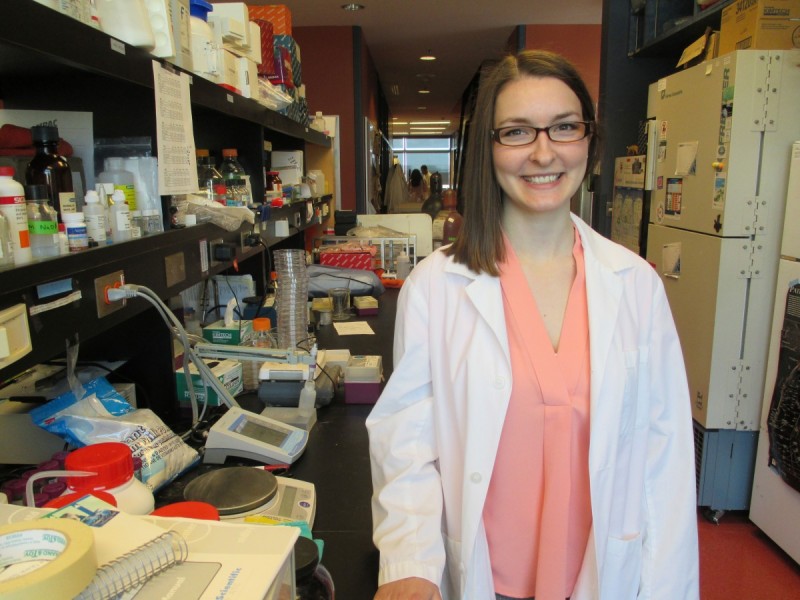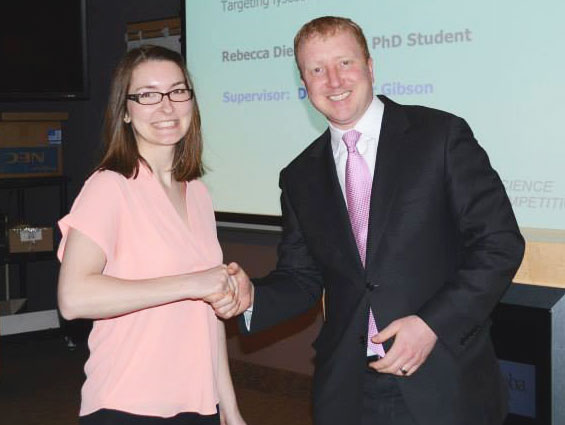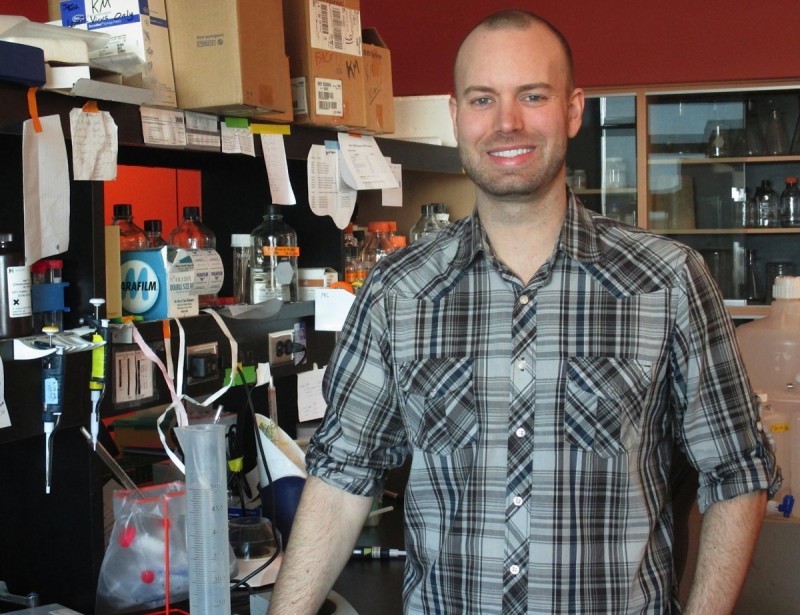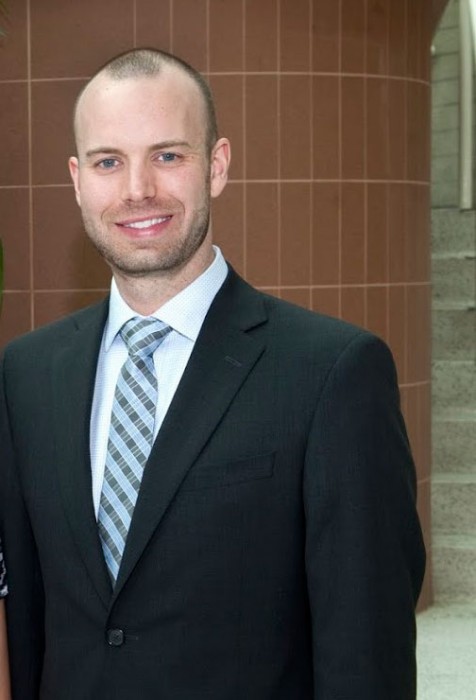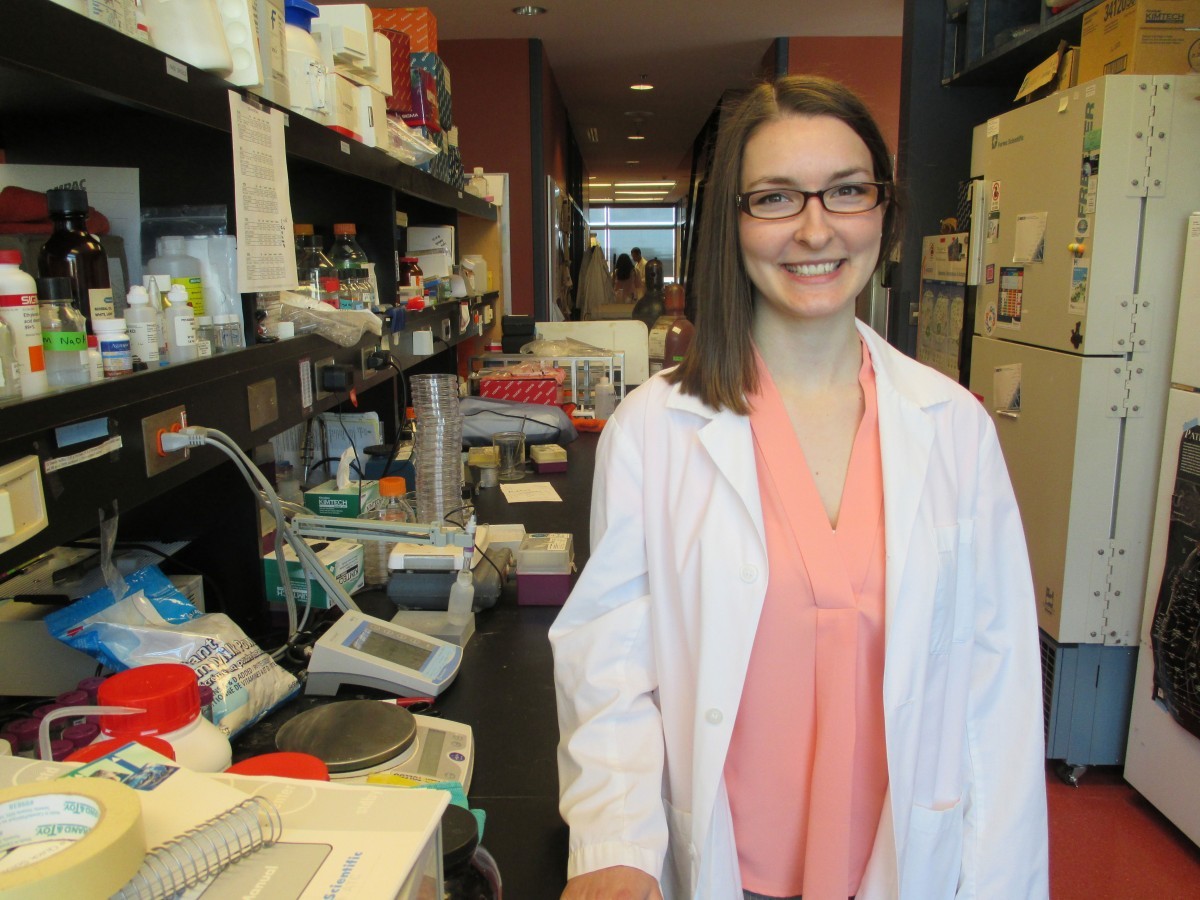
Rebecca Dielschneider, PhD candidate, immunology, College of Medicine.
The ‘perfect fit’: Graduate students find their research bliss
At the Manitoba Institute of Cell Biology
On the fifth floor at the Manitoba Institute of Cell Biology (MICB), you’ll find a lab where U of M graduate students in the College of Medicine are doing groundbreaking work.
The MICB, located at 675 McDermot Avenue, is a research institute partnership between the university and CancerCare Manitoba.
The lab has a team of 17 senior scientists, including doctors who have developed some of the world’s most effective cancer treatments. They supervise and mentor students doing their MSc or PhD work in cancer genetics and blood disorders.
Today UM Today brings you two additional profiles of graduate students working at that lab — these student researchers talk about what they do and what they love about research at the University of Manitoba.
***
Rebecca Dielschneider, PhD candidate, immunology, College of Medicine
Nova Scotian Rebecca Dielschneider knew she wanted to work in the medical and science research field ever since she saw a presentation on the flu virus in high school. Today, she’s working toward her PhD in immunology at the MICB under Spencer Gibson [PhD/’97].
Dielschneider [BSc (Hons.)/’11] [EM1] spends her days doing experiments with patient-donated blood, isolating cancer cells and peering through microscopes to study CLL (chronic lymphocytic leukemia). CLL is a cancer of the immune system and is the most common adult leukemia in North America.
“It’s a very interesting disease, both from a cancer-biology perspective, and from an immunology perspective,” Dielschneider said, sitting in an office the scientists refer to as the “Enterprise.” Filled with high-tech microscopic imaging equipment connected to computers, the room resembles the main deck of the Star Trek ship.
“These immune cells just go absolutely crazy and everything that immunologists know about these cells is completely the opposite when they become cancerous.”
Dielschneider is testing different therapies that target specific proteins, parts of the cell, and cell communications that change when they become cancerous. She recently completed a set of experiments on protein bonding, which took months to investigate. She’s on track to publish her first studies this summer.
Dielschneider: ‘I love to ask questions and I love to find answers.’
“I love to ask questions and I love to find answers. It’s so rewarding to discover something and to make progress and move a field forward — even one little glimmer of hope is all you need to get through the months of negative data or experiments that don’t work out the way you want them to.”
Besides the challenge of her research, Dielschneider loves graduate studies with the U of M because of the research community.
“The U of M has all the perks of some of the bigger universities in the country, but also the benefits of being in a smaller city — it’s a close-knit community.”
***
Brent Guppy, PhD candidate, biochemistry and medical genetics, College of Medicine
Brent Guppy went from managing a painting business with his brother to put himself through his undergraduate degree, to painting petri dishes with cancer cells for his PhD research.
For the last four years, Guppy [BSc(Hons.)/10] has been investigating cancer genetics under the supervision of Kirk McManus [PhD/’04]. The research focuses on finding ways to kill cancer cells without harming a patient’s healthy, normal cells.
It was the hands-on lab experience through a project course in genetics during his BSc (also at the U of M) that inspired him to pursue graduate studies in cancer research.
“You could say that cancer is really a genetic disease,” Guppy said over the sound of an autoclave sterilizing lab equipment behind him.
“There’s familial components to cancer, and then there’s non-familial components where something just happens to your genes and it sets the stage for cancer.”
He’s passionate about his research and describes it as a “perfect fit.”
Guppy is passionate about his research and describes it as a ‘perfect fit.’
He recently received the university’s 2014 Emerging Leader Award in the graduate student category. The Life Science Association of Manitoba also presented him with the Most Promising Life Science Student award in February.
Guppy serves on the U of M Graduate Student’s Association (UMGSA), and has advice for students who are thinking about pursuing grad studies at the U of M: come out to UMGSA events to help balance the stress of long days spent working and studying with fun and socializing.
But there’s not much that can keep him out of the lab.
“Every day, I get excited,” he said. “There’s times when I’m at home and thinking ‘I wonder what’s going on’? Then I get up in the morning and I’m excited to see what happened to the experiment because I’m really interested in finding out — it sounds so cheesy, but it’s almost like Christmas day, like ‘what did Santa bring?’”
Research at the University of Manitoba is partially supported by funding from the Government of Canada Research Support Fund.







